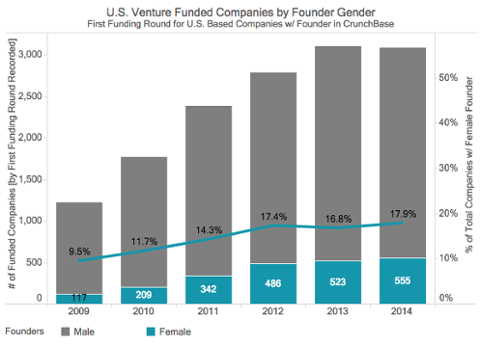
As a tech startup grows and expands its team, hiring a diverse staff becomes increasingly important. While large tech companies are dealing with backlash for
the lack of diversity in their workforce, startups have a unique opportunity to avoid that problem early on. Prioritizing diversity isn’t just about being politically correct or getting good PR; it has benefits that can give businesses a competitive edge. Companies that are racially and ethnically diverse are 35 percent more likely to financially outperform companies that lack diversity, according to a 2015
McKinsey report. Likewise, companies with greater gender diversity are 15 percent more likely to perform better. So what particular advantages does a diverse workforce give a young company? Here are some benefits for tech startups:
Diversity Improves Innovation
More diversity in thought leads to greater innovation, which is essential in the tech industry. That’s why Homebrew, a venture capital firm that invests in early-stage companies, has made diversity a priority with its businesses. “When you have five people on your team who come from the same background, you’re going to get the same types of thinking, and technology is a very innovative industry,” said Beth Scheer, Head of Talent at Homebrew. “In order to really spark innovation, you need to have some type of conflict. You need to have different types of thinking, and you’re only going to get that with people of different types of backgrounds.” Scheer authored Homebrew's
diversity guidelines, a resource that helps startups with basic concepts to consider as it develops a workforce. The document has been well received in the industry and covers topics such as how to write job descriptions, evaluate candidates, and handle salary negotiations to improve diversity. Scheer understands that startup founders are so busy running their business and focused on hiring good people that they can overlook diversity. But she says it’s not just about having top talent; it’s about having balance. And balance works both ways. “We have one company with female founders, and their audience is female millennials,” Scheer said. “They had to make a very deliberate decision not to just hire female millennials. So with their first hires, they made a point to create a pipeline of male candidates. They wanted to do that because they felt if they didn’t, their way of thinking about things was always going to be geared toward their audience, which was not going to spark any diversity in thinking.”
Diversity Can Improve Product Development
A more diverse workforce can also help startups create products that better serve different cultures. An article in
The New Yorker noted that Silicon Valley’s homogeneous culture is only solving problems of those who are young, male, white, and wealthy. With input from a diverse team, startups can create products that meet the needs of underserved demographics. Anthony Frasier, Entrepreneur in Residence at Newark Venture Partners, believes it’s time for companies to shift focus. “We need different perspectives on how to solve certain problems,” said Frasier, who advises startups. “Your community, your environment, how you were raised, the music you listen to, the people you hang around, all those things contribute to somebody’s thinking. When there’s a lack of minorities, especially in tech, there’s a lot of problems being solved but not for all communities. That’s an issue.”
Diversity Improves Company Culture
In a startup’s early stage, it forms a company culture, which includes its core values, vision, and work environment. Company culture is good for determining operations, but it can have a negative effect, as well. If the culture isn’t inviting and conducive to minorities and women, a business can’t recruit or retain a diverse workforce. Likewise, if a startup doesn’t feel a candidate fits its culture, it loses out on talent. According to Frasier, the culture in most tech companies is to blame for the lack of diversity. “Culture is the biggest reason (minorities) aren’t getting hired,” Frasier said. “I don’t have all the answers for that, but I do know we need to redefine what exactly is company culture. Right now, culture is the main culprit. The culture we have now in the tech industry just isn’t working.” Scheer believes there’s too much emphasis put on culture fit when hiring. Instead, she thinks companies should focus on what a candidate adds to the company culture. “I don’t like the term ‘culture fit.’ I really like ‘culture add,’” Scheer said. “The question I would pose a founder to ask about a candidate who they’re thinking of bringing on is ‘what is this person going to add to the team? What is this person going to add to the overall culture of the company?’ Not ‘how are they going to fit in?’ You shouldn’t have to fit in. You should be bringing something that’s new.”
 As a tech startup grows and expands its team, hiring a diverse staff becomes increasingly important. While large tech companies are dealing with backlash for the lack of diversity in their workforce, startups have a unique opportunity to avoid that problem early on. Prioritizing diversity isn’t just about being politically correct or getting good PR; it has benefits that can give businesses a competitive edge. Companies that are racially and ethnically diverse are 35 percent more likely to financially outperform companies that lack diversity, according to a 2015 McKinsey report. Likewise, companies with greater gender diversity are 15 percent more likely to perform better. So what particular advantages does a diverse workforce give a young company? Here are some benefits for tech startups:
As a tech startup grows and expands its team, hiring a diverse staff becomes increasingly important. While large tech companies are dealing with backlash for the lack of diversity in their workforce, startups have a unique opportunity to avoid that problem early on. Prioritizing diversity isn’t just about being politically correct or getting good PR; it has benefits that can give businesses a competitive edge. Companies that are racially and ethnically diverse are 35 percent more likely to financially outperform companies that lack diversity, according to a 2015 McKinsey report. Likewise, companies with greater gender diversity are 15 percent more likely to perform better. So what particular advantages does a diverse workforce give a young company? Here are some benefits for tech startups:
 As a tech startup grows and expands its team, hiring a diverse staff becomes increasingly important. While large tech companies are dealing with backlash for the lack of diversity in their workforce, startups have a unique opportunity to avoid that problem early on. Prioritizing diversity isn’t just about being politically correct or getting good PR; it has benefits that can give businesses a competitive edge. Companies that are racially and ethnically diverse are 35 percent more likely to financially outperform companies that lack diversity, according to a 2015 McKinsey report. Likewise, companies with greater gender diversity are 15 percent more likely to perform better. So what particular advantages does a diverse workforce give a young company? Here are some benefits for tech startups:
As a tech startup grows and expands its team, hiring a diverse staff becomes increasingly important. While large tech companies are dealing with backlash for the lack of diversity in their workforce, startups have a unique opportunity to avoid that problem early on. Prioritizing diversity isn’t just about being politically correct or getting good PR; it has benefits that can give businesses a competitive edge. Companies that are racially and ethnically diverse are 35 percent more likely to financially outperform companies that lack diversity, according to a 2015 McKinsey report. Likewise, companies with greater gender diversity are 15 percent more likely to perform better. So what particular advantages does a diverse workforce give a young company? Here are some benefits for tech startups:



